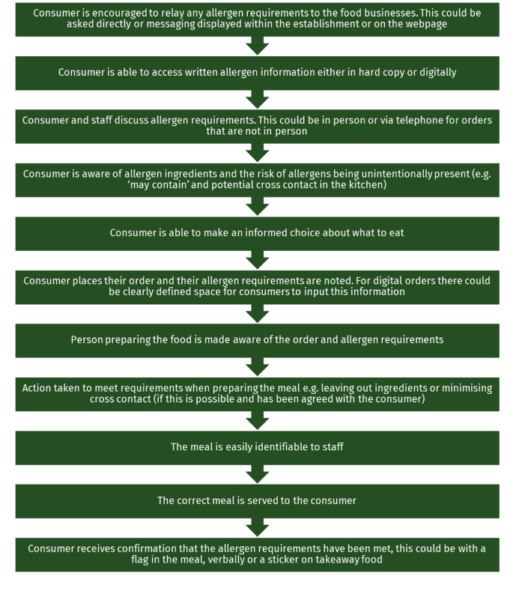The importance of written communication
The guidance puts great emphasis on written allergen information, to ensure consumers are fully aware of all allergens their food may contain. FSA suggests that written information should be easy to use, clear, comprehensive, accurate and in a format that best suits business models and brands.
It’s strongly recommended that consumers have easy access to written allergen information, whether that be physical or digital at their request, and during the order taking process, this information is accompanied by dialogue from as a server.
Allergen information cycle
The latest guidance also introduces an ‘Allergen information cycle’, showing a step by step flow of how information should be conveyed, ensuring adequate information is provided to consumers prior to placing an order.
Source: Food Standards Agency Allergen information cycle
The cycle is a useful tool to ensure the right approach is implemented for a seamless customer experience and is an excellent point of reference, especially when training new staff.
Voluntary ‘Free-from’ messaging
Voluntary ‘Free-from’ claims, such as ‘gluten-free’ or ‘peanut free’ can also be used to inform customers about products, in which allergen information may not be immediately obvious.
Although not mandatory, messaging like ‘may contain’ may also be considered to inform customers about unintended allergens due to the potential risk of cross contamination.
How does ICRTouch help
The ICRTouch ecosystem has been designed with ease of use in mind, to provide businesses with tools to guarantee a safe customer journey.
Controlled via TouchOffice Web, solutions like TouchPoint tills, TouchPoint lite all in one EPoS, PocketTouch order taking tablets, ByTable self ordering apps, TouchTakeaway webshops and SelfService kiosks all offer programmable allergen functionality.
Any of the 14 major allergens can be assigned to relevant menu items, prompting an allergen alert to pop up on screen if the desired product is selected. The seamless functionality significantly facilitates allergen communication and ensures a safe and positive customer experience.
For more information on allergen guidance and compliance, visit the FSA website, or reach out to a local Authorised Partner who’ll happily assist you.


















